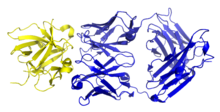Canakinumab

| Monoclonal antibody | |
|---|---|
| Type | Whole antibody |
| Source | Human |
| Target | IL-1β |
| Clinical data | |
| Trade names | Ilaris |
| AHFS/Drugs.com | Consumer Drug Information |
| License data |
|
| Routes of administration | intravenous, subcutaneous |
| ATC code | |
| Legal status | |
| Legal status |
|
| Identifiers | |
| CAS Number | |
| DrugBank | |
| ChemSpider |
|
| UNII | |
| ChEMBL | |
| Chemical and physical data | |
| Formula | C6452H9958N1722O2010S42 |
| Molar mass | 145.2 kg/mol g·mol−1 |
| | |
Canakinumab (INN, trade name Ilaris, previously ACZ885)[2] is a human monoclonal antibody targeted at interleukin-1 beta. It has no cross-reactivity with other members of the interleukin-1 family, including interleukin-1 alpha.[3]
Canakinumab was approved for the treatment of cryopyrin-associated periodic syndromes (CAPS) by the U.S. Food and Drug Administration (FDA) on June 2009[4] and by the European Medicines Agency in October 2009.[5] CAPS is a spectrum of autoinflammatory syndromes including familial cold autoinflammatory syndrome, Muckle–Wells syndrome, and neonatal-onset multisystem inflammatory disease. On September 2016, FDA approved the use of canakinumab on 3 additional rare and serious auto-inflammatory diseases:[6] Tumor Necrosis Factor Receptor Associated Periodic Syndrome (TRAPS), Hyperimmunoglobulin D Syndrome (HIDS)/Mevalonate Kinase Deficiency (MKD) and Familial Mediterranean Fever (FMF).
Canakinumab was being developed by Novartis for the treatment of rheumatoid arthritis but this trial was completed in October 2009.[7] Canakinumab is also in phase I clinical trials as a possible treatment for chronic obstructive pulmonary disease,[8] gout and coronary artery disease. It is also in trials for Schizophrenia.[9] In gout it may result in better outcomes than a low dose of a steroid but costs five thousand times more.[10]
References
- ^ PMID 26284424
- ^ Dhimolea, Eugen (2010). "Canakinumab". MAbs. 2 (1): 3–13. doi:10.4161/mabs.2.1.10328. PMC 2828573. PMID 20065636.
- ^ Lachmann, HJ; Kone-Paut I; Kuemmerle-Deschner JB; et al. (4 June 2009). "Use of canakinumab in the cryopyrin-associated periodic syndrome". New Engl J Med. 360 (23): 2416–25. doi:10.1056/NEJMoa0810787. PMID 19494217.
- ^ "New biological therapy Ilaris approved in US to treat children and adults with CAPS, a serious life-long auto-inflammatory disease" (Press release). Novartis. 18 June 2009. Retrieved 28 July 2009.
- ^ Wan, Yuet (29 October 2009). "Canakinumab (Ilaris) and rilonacept (Arcalyst) approved in EU for treatment of cryopyrin-associated periodic syndrome". National electronic Library for Medicines. Retrieved 14 April 2010.
- ^ "FDA approves expanded indications for Ilaris for three rare diseases". FDA News Release. 23 September 2016.
- ^ "clinicaltrials.gov, Identifier NCT00784628: Safety, Tolerability and Efficacy of ACZ885 (Canakinumab) in Patients With Active Rheumatoid Arthritis". Retrieved 21 August 2010.
- ^ Yasothan U, Kar S (2008). "Therapies for COPD". Nat Rev Drug Discov. 7 (4): 285. doi:10.1038/nrd2533.
- ^ https://www.neura.edu.au/clinical-trial/cats/
- ^ Sivera, F; Wechalekar, MD; Andrés, M; Buchbinder, R; Carmona, L (1 September 2014). "Interleukin-1 inhibitors for acute gout". The Cochrane database of systematic reviews. 9: CD009993. doi:10.1002/14651858.CD009993.pub2. PMID 25177840.
